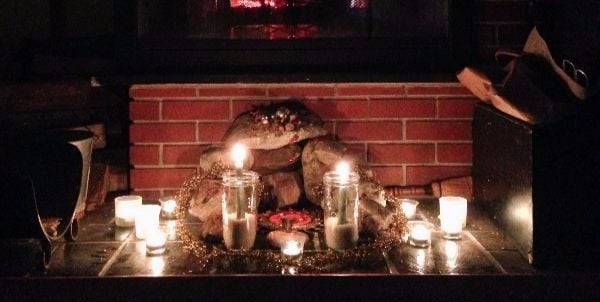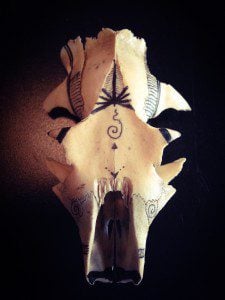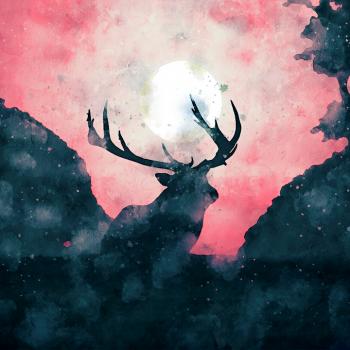We fear death. Standard American culture is built around a Christian worldview where death is a judgement between Heaven and Hell. I am aware that there are other options and other religions here. However, the bias in our country is towards devils and angels as seen time and time again in pop culture and even our daily conversations. I’m not saying Christians are the only one with judgement after death, but I am saying that is what our society’s health infrastructure is built on. We prolong life whenever possible without considering if that is a good thing or not. We obsess with looking younger because aging is weakness, the end of ego, and judgement.
The thing is about this gambling game we call life: the House always wins in the end.
Whether or not we want it, or like it, if we embrace it or run from it, Death comes for us all. As a Priest or spiritworker in your community it is likely that you will be called upon to do death work. It will quite possibly be something of an emergency, it will be emotionally charged, and it will be hard labor. It is quite possible that you will be called to do death work for people who are not of your pagan tradition, and you may need to research Gods or traditions. Death work is not easy. Partially this is because the transition from life to death is inherently challenging. Partially it is because the dominant paradigm fears and hides from death.

We mostly think about Death work as funerary work. It takes place after someone has passed and involves a great many laws about how the body can be prepared and what happens to it. Deathwork also involves various traditions of helping the spirit pass, mourning, caretaking and remembrance. What I have found is that there is much less focus on preparing for death than there needs to be.
We are not prepared for death. It is the one great transition we try to ignore. We prepare our children to leave the home, modern weddings are an extended hazing ritual that ends with a couple knowing they will put up with a great deal in order to be together. Moving from one city to another involves a great deal of preparation and effort, but we don’t put that time in for Death.
As magical practitioners, clergy, and witches we need to be prepared for this work. It even has a name now: Death Doula. I was so excited to discover there are people who are actually trained in this work, but their services are not always available and sometimes we want to do this work within our own communities. What follows is a summary of my experience and research into supporting those who are dying as a volunteer clergy person in my local community.
Preparing the Soul for Death: Purification, Narrative, and Completion
I pull my death work techniques from the lore as well as from modern psychological and chaplaincy practice. Some years ago I was gifted a copy of Professional Spiritual and Pastoral Care: a Practical Clergy and Chaplain’s Handbook and while a great deal of what it covered only mattered when you are attempting to get medicaid to pay for services rendered, there was also good information on modern best practices in hospice. By combining the two sources I think we can do a good job of creating something useful. If you are a person who cries easily in the face of death, you may want to get someone else to help with this work. Both speaking and listening are important aspects of the work and you can’t do either if you’re caught in your own emotional rollercoaster. It’s okay to admit this and it’s a good reason why more than one person in your community should have that skill set.
Purification
Purification as a task comes from the spiritual traditions. Eventually I’d like to do a series of post on purification, but for now I will just summarize some of the techniques I’ve used for this particular kind of purification. Ideally I like to purify the person with at least three substances. This is done according to their tradition and requires research into their tradition. It is one place where I don’t worry about cultural appropriation for a couple of reasons: I am not planning on profiting off of this work, I am doing this work for my community for specific people, and I am not willing to tell someone I won’t work with their personal gods when it comes to their death. So I’ve worked with Norse, Celtic, Egyptian, and Christian frameworks. I suggest doing your own research and doing it well. This is not a good time to mess up who is who.
If possible gathering some soil from their home, or even better from each of the places that they’ve lived works very well. It is incredibly connecting to the Earth Mother, and is excellent for purification by the earth element. Salt water is also grounding and purifying. Make sure whatever you use isn’t caustic or annoying. If you’re going to use scented oil, make sure you have a carrier oil. Incense is also very potent and useful, I prefer to make my own. I find mugwort, lavender, balsam fir, and cedar to be good options. I wouldn’t use juniper, since the smoke is too strong. If you are in a hospice or hospital setting you will need to check on the rules about smoke and flame.

Narrative
As a priest, death doula, or helper it’s not your job to create narrative. One of your most important tasks is to help the dying articulate their own narrative. In other words, you listen to them tell their stories. It probably won’t be linear, or even make sense to you. It may be symbolic. They may well tell you stories assuming you know who relatives are, and may not be able to speak well. This task is built out of modern psychological and chaplaincy knowledge. I suggest brushing up on your active listening skills. This is not a standard conversation, though it can be conversational at its best. Ask questions, be curious, and be interested. If you’re not genuinely interested in that person, you probably shouldn’t be the one helping them pass into death. You can assist by bringing them photo albums, personal items, or religious items to share and talk about.
All of this needs to be respectful and you can’t make anyone talk, not even someone you love. Part of the difficulty with death is that each of us comes to it in our own way, even when we’ve been taught how to integrate it into our lives. In our society it’s a hit and miss process. Do you best and make sure to share your difficulties with friends and loved ones. It’s especially useful to process with people who aren’t also close to the person who is approaching death. It’s often useful to use the Ring Theory to help us choose who to share our troubles with.
Completion
It is what it says: the completion of a life. Sometimes things are left undone. There are times when people are near death and having difficulty crossing over. We all know the stories of the unquiet dead who speak to the living in an attempt to finish their business. Some of us know real spirit workers who specialize in helping and quieting those who died with unfinished business. For those of us who have the opportunity, we can help people who have not yet passed to finish those tasks or come to terms with an inability to do so. No need to knock dishes over and stop clocks, just some simple words. That doesn’t mean it’s easy.

When you’re listening and sharing memories, these things can come up quite naturally. Sometimes it’s a wish to see a person or a place, sometimes it’s a task left unfinished, or a fear for their loved ones. If they’re not conscious, trancework and divination can help you figure out what’s going on. If you are not skilled in these tasks, it’s not the time to run out and buy some tarot cards. For the love of all the spirits and gods do not go find some random psychic to help you. If you truly don’t know anyone, look toward your local community leaders, and get more than one opinion. In most towns there are reputable diviners and spiritworkers, whether they call themselves priests, shamans, or spirit workers. Deathwork is a specialization. It’s the equivalent of being an endocrineologist or another specialty doctor, so try to look for someone who regularly works with the dead. This is just one more reason why I encourage people to be part of their local pagan community.
Ritual and Spirituality in the Dying Process
This is the part where you as a spiritworker, shaman, or priest may need to do more talking than listening. But only after you’ve listened closely. We know that the Egyptians and Greeks had prayers that were meant to prepare the soul to travel to the afterlife. Death rites can be powerful both for the dying and for those who love them. If you have experience with good Samhain rituals you will have seen humans in grief catharsis, where they are crying in the good way and allowing themselves to mourn. This kind of catharsis is incredibly powerful and is one of my goals when I am creating a death rite. The other half is that preparation of the soul.
I would suggest starting your rite with purification, then calling on the gods and goddesses that the individual and their family worship or work with, next talking about the journey to the underworld in the context of their preferred cultural traditions. Affirm that there is readiness for them to leave this world. You may need to do some work with the living to help them be in a space where they truly are ready to let go. Affirm how much those they leave behind will miss them, and love them. Then continue to affirm: though they love the dying individual, they are ready to let them go.
I find that the affirmation of love combined with the affirmation of the transition is very powerful.
After these affirmations, there may be other work that involves statements about those things that still need to be completed from the individuals life, spiritual bargains that must be kept, people that they are concerned about being cared for. Tasks being completed. Oaths from the living to promise to do these sorts of tasks can very good.
After the affirmations and promises, a final blessing that describes the process of the soul reuniting with the ancestors who have gone before is appropriate.
Here is a short purification and affirmation I wrote:
By water we would purify you, so that your heart may be light as a feather. Do you will it that this would be so?
By oil we would purify you, so that your soul may fly freely from you as bird in flight through the starry sky. Do you will it that this would be so?
By earth we would purify you so that your essence may be clear, your breath be eased, our mother, the earth to receive you. Do you will it that this would be so?
You are pure, as you were pure, and you will be pure. From love you have come and to love you will go, and into love to be born again. For yours is a beautiful soul. You are a treasure among us that we are loathe to let go. But you will fly and be among the stars and we will speak to you with our souls. Your beloved dead wait for you along the path of the sacred journey like candles in the night those who have gone before you are as the waiting stars in the sky.
Beloved in the now, beloved in the past, and beloved in the future, be it so.
If you find value in my work and would like to support that work, please consider coming into reciprocity by becoming a Patreon. Thank you, and may the spirits aid and bless your work as well.
















